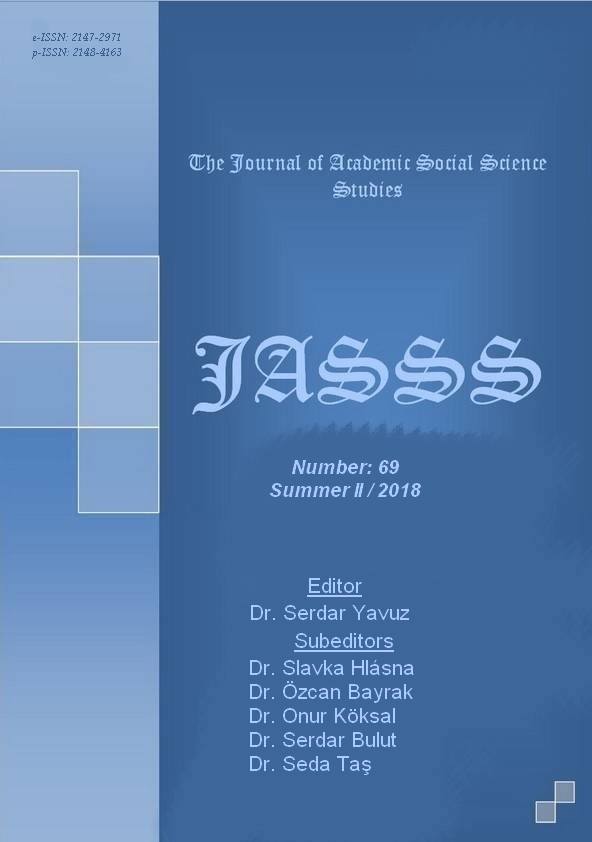Author :
Abstract
Suriyeli mültecilerin komşu ülkelere ve Avrupa'ya doğru büyük çaplı yerlerinden edilmesine bağlı olarak yaşanan mevcut göç krizi, bir yandan göç konusundaki tartışmayı yeniden canlandırırken, diğer yandan Afrika ülkelerinden Avrupa'daki “Eldorado” ya göç olgusunu şaşırttı. 1980'lerden önce, fakir ülkelerden göç, bu ülkeler için kayda değer bir kayıp olarak görülüyordu. 2000'li yıllarda göçmenler kalkınma uygulayıcıları tarafından Afrika ülkelerinin gelişiminde önemli aktörler olarak algılandılar. Günümüzde göçmenler, Afrika hükümetleri tarafından, kalkınma için gerçek ortaklar olarak görülmektedir. Ancak, katkıları genellikle sadece ekonomik düzeyde tutulmaktadır. Aslında, göçmenlerin kendi toplumlarının gelişimine katkısı çoğu zaman parasal ve parasal olmayan gönderdiklerini indirgenmektedir. Ancak özellikle derneklerde örgütlenen göçmenler, kültürel ve insani düzeylerde de hareket etmektelerdir. Orta Togo Bölgesi, çoğu Togoluların göç ettiği bölgelerden biridir. Ailelerine para ve maddi mal gönderirler ve topluluklarının gelişimi için çalışıyorlar. Ancak, bu eylemlerin faydalanıcıların yaşam koşulları üzerindeki gerçek etkisi halen devam etmektedir. Bu Bölgeden gelen göçmenlerin eylemlerini anlamak için, bu genç erkekleri ve kadınların gitmesini sağlayan sebeplerin anlaşılmasını da gerektirir. Bu çalışma, göçmenlerin Togo'nun Orta Bölgesi'nin gelişimine olan etkisinin gerçek etkisini analiz etmeyi amaçlamaktadır. Aslında, eylemlerinin toplumun mikro ve mezo düzeyindeki nüfus yaşam koşulları üzerinde bir etkisi vardır. Her şeyden önce, bu çalışma göç ve göç alan bölgelerin gelişimi arasındaki ilişkiyi sorgulamaya çalışmakta ve diaspora'nın bu bölgelerin yerel kalkınmasına yönelik eylemlerinin kârlılığını maksimize etmek için bazı alternatifler önermeye çalışmaktadır. Bu çalışma mevcut literatüre dayanmakla birlikte, özgünlüğü, esas olarak, çalışma ortamının ampirik çalışmalarını ve saha verilerini dikkate alması gerçeğinde yatmaktadır.
Keywords
Abstract
The current migratory crisis due to the massive displacement of Syrian refugees towards neighboring countries and Europe has, on the one hand, revived the debate on the migration issue and on the other hand occulted the migration phenomenon from African countries to European "Eldorado". Before the 1980s, emigration from poor countries was considered a considerable loss for these countries. In the 2000s, migrants were perceived by development practitioners as important actors in the development of African countries. Nowadays, emigrants are seen by African governments as true partners for development. However, their contribution is often apprehended only on the economic level. In fact, the contribution of emigrants to the development of their home societies is often reduced to the remittances they make. Yet emigrants, especially organized in associations, also act on the cultural and humanitarian levels. The Central Region of Togo is one of the regions from which most Togolese emigrate. They send money and material goods to their families and they are working for the development of their communities. However, the question of the real impact of these actions on the living conditions of the beneficiaries remains. Understanding the actions of emigrants from this Region also requires an understanding of the causes that drive these young men and women to leave. This study aims to analyze the real impact of the contribution of emigrants on the development of the Central Region of Togo. In fact, their actions have an impact on the population living conditions at the micro and meso level of the society. But the migratory phenomenon also has negative consequences on the originated societies of emigrants, consequences which must be taken into account to apprehend migrations in their totality. Above all, this study tries to questioning the relation between migration and development of regions of departure of migrants and tries to propose some alternatives to maximize the profitability of diaspora's actions on the local development of these regions. Although this study is based on existing literature, its originality lies in the fact that it essentially takes into account the empirical works and the field data of the study environment.





